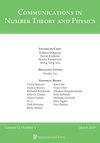$D^8\mathcal{R}^4$亏格两字符串不变量的渐近性
IF 1.2
3区 数学
Q1 MATHEMATICS
引用次数: 25
摘要
我们继续研究II型超弦理论中作为低能有效相互作用系数的亏格2上出现的模图函数和串不变量。在先前的工作中,权重为$w$的亏格二模图函数的非分离退化被证明是由次数为$(w,w)$的退化参数$t$中的Laurent多项式给出的。该多项式的系数将亏格一模图函数推广到$t$中被指数抑制为$t\到\infty$的项。在本文中,我们明确地评估了与$D^8{\cal R}^4$有效相互作用相关的模图函数的这种展开,其中Laurent多项式具有次$(2,2)$。我们还证明了分离退化是由退化参数$\ln(|v|)$中的多项式给出的,直到贡献在$v$中表现为$v\to0$的幂。我们进一步提取了完全退化或热带退化,并将其与费曼图之和的被积函数的独立计算进行了比较,费曼图有助于两个回路II型超重力在低能量膨胀中膨胀到相同阶次。我们发现弦理论被积函数的热带极限再现了超重力被积函数作为其前导项,但也包括与奇ζ值成比例的子前导项,这些子前导项在超重力中不存在,可以归因于更高导数的弦相互作用。本文章由计算机程序翻译,如有差异,请以英文原文为准。
Asymptotics of the $D^8 \mathcal{R}^4$ genus-two string invariant
We continue our investigation of the modular graph functions and string invariants that arise at genus-two as coefficients of low energy effective interactions in Type II superstring theory. In previous work, the non-separating degeneration of a genus-two modular graph function of weight $w$ was shown to be given by a Laurent polynomial in the degeneration parameter $t$ of degree $(w,w)$. The coefficients of this polynomial generalize genus-one modular graph functions, up to terms which are exponentially suppressed in $t$ as $t \to \infty$. In this paper, we evaluate this expansion explicitly for the modular graph functions associated with the $D^8 {\cal R}^4$ effective interaction for which the Laurent polynomial has degree $(2,2)$. We also prove that the separating degeneration is given by a polynomial in the degeneration parameter $\ln (|v|)$ up to contributions which are power-behaved in $v$ as $v \to 0$. We further extract the complete, or tropical, degeneration and compare it with the independent calculation of the integrand of the sum of Feynman diagrams that contributes to two-loop type II supergravity expanded to the same order in the low energy expansion. We find that the tropical limit of the string theory integrand reproduces the supergravity integrand as its leading term, but also includes sub-leading terms proportional to odd zeta values that are absent in supergravity and can be ascribed to higher-derivative stringy interactions.
求助全文
通过发布文献求助,成功后即可免费获取论文全文。
去求助
来源期刊

Communications in Number Theory and Physics
MATHEMATICS, APPLIED-MATHEMATICS
CiteScore
2.70
自引率
5.30%
发文量
8
审稿时长
>12 weeks
期刊介绍:
Focused on the applications of number theory in the broadest sense to theoretical physics. Offers a forum for communication among researchers in number theory and theoretical physics by publishing primarily research, review, and expository articles regarding the relationship and dynamics between the two fields.
 求助内容:
求助内容: 应助结果提醒方式:
应助结果提醒方式:


